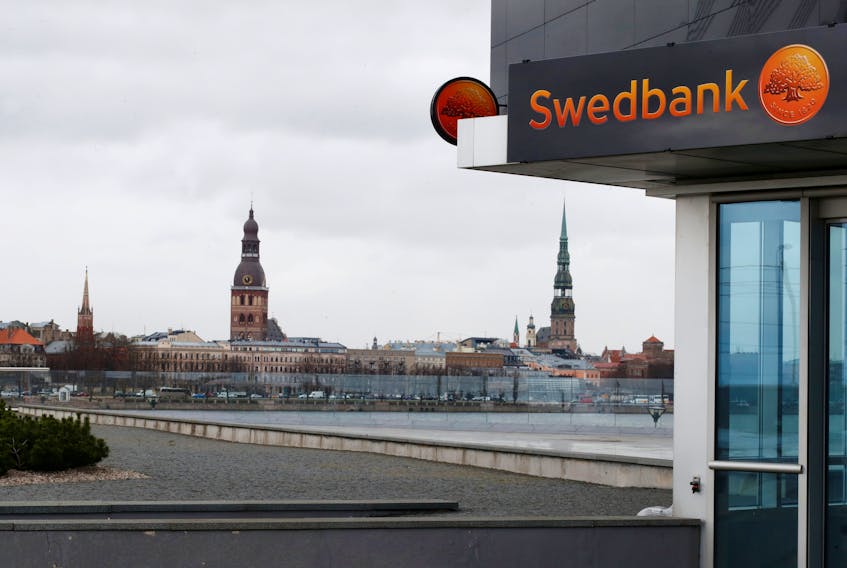By John O'Donnell and Gederts Gelzis
FRANKFURT (Reuters) - Latvia's prime minister has promised to accelerate an overhaul of the banking sector as fears grow that money laundering scandals could single the country out as high risk, prompting Swedish lenders to leave and isolating the Baltic state.
In an interview with Reuters, Krisjanis Karins said he would take earlier reforms a step further and change rules on management appointments at the country's banking regulator, while granting it the power to close banks with "dirty money".
"We are giving out a signal to those individuals or companies looking for a place to launder money," said Karins, who took over as prime minister in January. "We are saying we are not open for business."
Early last year, U.S. authorities accused Latvia’s third biggest bank, ABLV, of money laundering and breaking sanctions on North Korea, prompting its closure and triggering the country's worst financial crisis in a decade.
Latvia now faces a review by international money-laundering standards watchdog Moneyval in coming months, which some officials fear could label the country as risky, alongside the likes of Serbia and Pakistan.
The body issued a highly critical assessment of Latvia last year, citing corruption, vulnerability to international organized crime and exposure to corruption in neighboring former soviet states.
Acknowledging the threat of what officials call grey-listing, Karins said the country was serious about tackling corruption and financial crime, appealing directly to Swedish banks not to lose faith.
Swedbank has been drawn into a Baltic money laundering scandal that has wiped billions of euros off its market value, prompting fears among some Latvian officials that it could follow Danish rival Danske in leaving the area.
"These banks are important to our region. They are important to our financial stability," Karins said.
"My message to them is very simple. They can rest assured that we are creating a very resilient system."
A spokesman for Swedbank said that it would "continue to be the bank for the many households and corporates" in Sweden, Latvia, Lithuania and Estonia.
SEB Chairman Marcus Wallenberg recently said the region would remain an "important part" of future strategy.
GREY MONEY
Latvia's finance minister, Janis Reirs, who visited Washington this week to outline his country's progress to top U.S. officials, said investigating and prosecuting of financial crime would improve.
He met Marshall Billingslea, who leads the Office of Terrorist Financing and Financial Crimes at the U.S. Treasury, according to officials.
"This grey money is one of the main feeding sources for corruption," Reirs told Reuters.
The stakes are high for one of Europe's poorest countries. While Latvia's economy is growing, Morten Hansen, of the Stockholm School of Economics in Riga, said any grey-listing could hit its credit rating, risking a recession.
Nonetheless, the push by the new government, built on a fragile coalition of five parties, to reinvigorate reforms faces obstacles, including open divisions between lawmakers and the institutions tasked with policing banks.
Peters Putnins, who heads the Financial and Capital Market Commission, which supervises banks, said the government's reforms amounted to political interference in his work and were a veiled attempt to oust him.
"This is reorganization ... to change the ... staff of the supervisory board of the commission," he told Reuters. "The banking supervision must be independent. If this is not political interference, what is this?"
Since Latvia secured independence from Russia in 1991, more than a dozen of its banks have promoted themselves as a gateway to Western markets for clients in former Soviet states, promising Swiss-style secrecy.
That policy has now been abandoned under pressure from the U.S. and despite predictions by Latvian officials a year ago that many would close, the banks are still open.
Karins said the sector has been cleaned up but changing its approach to banking is still a difficult balancing act for Latvia.
Washington is an important military ally for the former Soviet-ruled state of 2 million people on the EU’s eastern flank. It also has close historical and trade ties with Russia.
Karins appealed for a joint European effort to tackle money laundering, criticizing the "patchwork" of laws around the region. "It's a European problem," he said. "Banks in this region have been used ... as transit runs."
(Writing By John O'Donnell; Editing by Kirsten Donovan)









